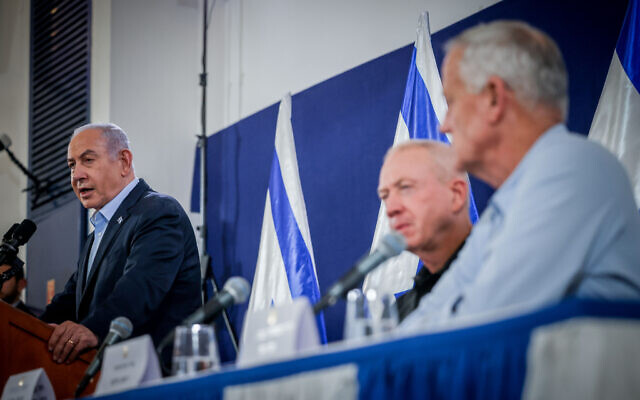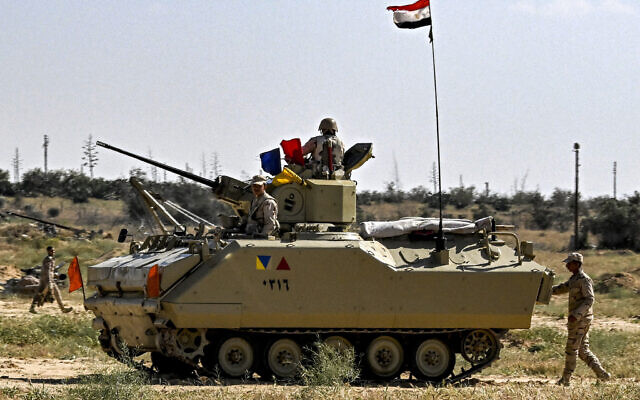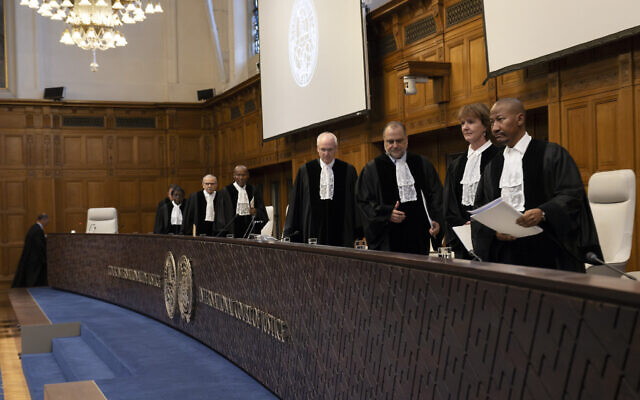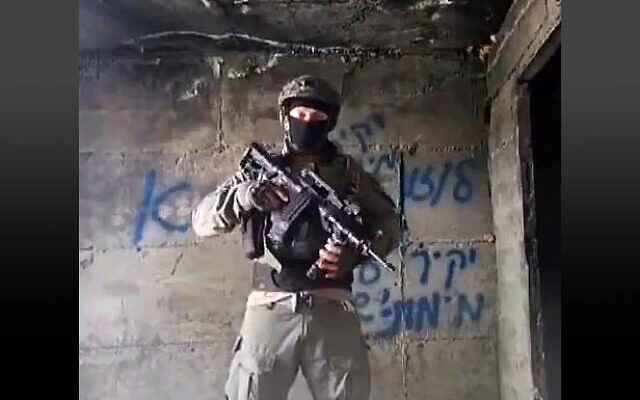This Editor’s Note was sent out earlier Wednesday in ToI’s weekly update email to members of the Times of Israel Community. To receive these Editor’s Notes as they’re released, join the ToI Community here.
“Together we will win,” proclaims the ubiquitous slogan on stickers, billboards, banners several stories high. But from the very top, Israel is not together.
It’s understandable that our traumatized public does not speak and act with one voice as Israel seeks a way out of our ongoing post-October 7 disaster, but it’s unforgivable, and extremely dangerous, from the leadership whose job and responsibility it is to lead the recovery.
Two of the three ministers helming the campaign against Hamas — Defense Minister Yoav Gallant and National Unity Party leader Benny Gantz — have both publicly indicated their fear and belief that Prime Minister Benjamin Netanyahu’s stewardship of the war is being determined by his personal and narrow political interests rather than the national good.
That’s both staggering and terrifying.
Gallant, speaking two weeks ago, called on Netanyahu to make the tough decisions necessary “for the future of our country, favoring national priorities above all other possible considerations, even with the possibility of personal or political costs.”
For his part, three days later, Gantz promised that were Netanyahu to choose “the national interest over the personal, in the footsteps of Herzl, Ben Gurion, Begin and Rabin,” National Unity would stay in the wartime coalition. But as things stand, Israel was “heading for the rocks.” And his party would be compelled to leave imminently, Gantz said, “if you choose the path of the zealots and lead the whole state into the abyss.”

Prime Minister Benjamin Netanyahu (left), Defense Minister Yoav Gallant (center), and war cabinet minister Benny Gantz address a press conference at the Defense Ministry headquarters in Tel Aviv, November 22, 2023. (Chaim Goldberg/Flash90)
The friction runs wider and deeper — with the coalition’s far-right ministers and most of those in Netanyahu’s Likud deeply at odds with the leaders of the defense establishment over such central issues as the conduct of the war, terms for a potential hostage deal, drafting members of the ultra-Orthodox community, the future governance of Gaza, interaction with the Biden administration, and much more.
Some ministers, in cabinet meetings last October, warned against the very idea of a ground offensive in Gaza, fearing massive IDF losses. Now they complain that the IDF did not tackle Gaza City and Rafah simultaneously from the start.
In the top echelons of some of the defense hierarchies, it is argued adamantly that Israel should be prepared to consent to Hamas’s demand “to end the war” if this will secure the release of the hostages, and that Hamas can, unfortunately, be relied upon to provide ample cause for a further major campaign in the future; Netanyahu and his core coalition colleagues disagree.
The IDF is desperate for more soldiers — it urgently needs the tens of thousands of potential Haredi recruits — but it cannot absorb them all at once, does not want to be dragging young ultra-Orthodox men into service, and favors a gradual, negotiated, multi-year process. The core coalition, deferring to its two ultra-Orthodox parties, by contrast, is insistently seeking to maintain the current inequality and finding ruses to try to prevent Supreme Court intervention.
And on it goes.
Israel’s current situation is dire and, in some areas, worsening.
There is no Hamas readiness for a genuine deal to free all the hostages, even were Israel to declare it would end the war. There is, rather, a Hamas desire to manipulate any future deal in order to get large numbers of life-term terror chiefs released into the West Bank. As merely hinted by the latest relatively minor upsurge in attacks from the Tulkarem area of the West Bank on the adjacent central Israeli town of Bat Hefer, delightedly claimed by Hamas, its goal is to set the West Bank alight.
בפעם השנייה ביומיים האחרונים: מחבלי חמאס מתעדים את עצמם יורים מאזור טולכרם לעבר בת חפר. אין נפגעים pic.twitter.com/Rp270bEAtE
— Carmel Dangor כרמל דנגור (@carmeldangor) May 29, 2024
Hezbollah is firing dozens of rockets and missiles into northern Israel most days of the week, 50,000 Israelis have been displaced from their homes there for nearly eight months, and Education Minister Yoav Kisch acknowledged on Wednesday that there is no clear prospect of them returning any time soon. The IDF, which has been trying to degrade Hezbollah with targeted strikes on hundreds of operatives, is braced for potentially devastating escalation at any moment, and preparing for a major military operation that it would prefer not to have to begin until it has completed its current, immensely complex campaign in Rafah.
It is hard to recall a period when the relationship between Israel’s political leadership and its army and intelligence services was so fraught, out of sync and beset by mistrust.
Or a period when such friction and lack of strategic cohesion was so threatening to the nation’s very future.
“Together we will win”? Well then, get it together, for Israel’s sake.
Egyptian fog
The IDF has been markedly cagey in recent days about the progress of its operation to take control of the 14-kilometer Gaza-Rafah border strip.
By most accounts, as of Tuesday, troops had deployed along more than half of the so-called Philadelphi Corridor. National Security Adviser Tzachi Hanegbi on Wednesday said Israel holds 75% of the route.
The IDF has also apparently identified dozens of cross-border tunnels via which Hamas has smuggled in arms, weapons components, the machines and materials it uses to construct its tunnel network, and much more besides.
But the IDF is not saying too much about those discoveries, either.

Egyptian army soldiers man an infantry fighting vehicle (IFV) deployed near the Egyptian side of the Rafah border crossing with the Gaza Strip on March 23, 2024 (Khaled Desouki / AFP)
Evidently, this policy is designed to avoid discomfiting the Egyptians.
Telling the world that Israel has taken over the border would be perceived, within Egypt and parts of the region, as an affront to Egyptian sovereignty. Telling the world of the discovery of dozens of arms smuggling tunnels would make the Egyptians look incompetent.
It is understood that Israeli officials coordinated key elements of the Rafah operation with their Egyptian counterparts ahead of time. Officially detailing that would also potentially complicate things for Cairo.
Misreporting the ICJ’s ambiguity
According to the New York Times, the ruling by the International Court of Justice on Rafah was clear and definitive. The newspaper’s website headline, immediately after the judges had issued their decision on Friday afternoon, reported: “Top UN court orders Israel to halt its offensive in Rafah.”
The Wall Street Journal was also certain about what the 15 esteemed judges had ordered Israel to do… but it differed from the Times’ summation: “UN court orders Israel to halt some military operations in Rafah,” proclaimed the Journal (emphasis added).
These are two of the world’s most widely read newspapers, and also two extremely well-resourced newspapers, with large editorial operations and some of the smartest and most experienced reporters in the business. And yet they understood the ICJ’s ruling differently.
All three of the world’s leading international news agencies have been echoing the Times’ conclusion: The ICJ, in Reuters’ boilerplate language, “ordered Israel to immediately halt its military assault on Rafah.” Agence France Presse states in every relevant article that “the International Court of Justice ordered Israel to end its military offensive in Rafah.” So, too, the Associated Press, which tells all its subscribing media outlets that the court “demanded that Israel immediately halt its offensive on Rafah.”
Except, curiously, not even the Times’ own reporting on the order always reflects the paper’s headline certainty as regards the judges’ demand: An article on Saturday by its Jerusalem bureau chief opened with the caveated summation: “…a day after the world’s top court appeared to order Israel to ‘immediately’ cease its military campaign in the southern Gaza city” (emphasis added).
In fact, any remotely serious examination of the court order and accompanying interpretations filed by its justices shows how ambiguous the decision actually is.
The key sentence in the ruling states that Israel “must immediately halt its military offensive, and any other action in the Rafah governorate, which may inflict on the Palestinian group in Gaza conditions of life that could bring about its physical destruction in whole or in part.”
One judge, South Africa’s Dire Tladi, was adamant that this formulation, in “explicit terms, ordered the State of Israel to halt its offensive in Rafah.”
Four other judges (including Israel’s Aharon Barak) argued that it did nothing of the sort, with the ICJ’s Vice President Julia Sebutinde, from Uganda, going so far as to caution that “… this directive may be misunderstood as mandating a unilateral ceasefire in Rafah.” Quite the opposite, she asserted: “This measure does not entirely prohibit the Israeli military from operating in Rafah. Instead, it only operates to partially restrict Israel’s offensive in Rafah to the extent it implicates rights under the Genocide Convention” (emphases added).
The other 10 justices offered no interpretations of the ruling.

Judges arrive at the International Court of Justice (ICJ) to rule on South Africa’s request on a Rafah and wider Gaza war ceasefire, in The Hague, on May 24, 2024 (Nick Gammon / AFP)
The 15 judges of the world’s top court are, without doubt, capable of penning a definitive sentence. Had they wished to, they could and would simply have stated: “Israel must immediately halt its military offensive in Rafah.” Clarifications as to why such an order was being made could have been included in previous or subsequent separate sentences. Instead, they constructed a three-clause formulation whose meaning they themselves publicly disagree about.
The only reasonable conclusion is that they were being deliberately ambiguous, reflecting their own disagreements. That’s a pretty dismal state of affairs that deeply undermines the court’s own credibility.
Still more dismal, however, is that, in most reporting, including by the world’s most influential news agencies and some of its most influential newspapers, there was and remains no hint of any such ambiguity — but only a selective summation, misrepresented as definitive, that, surprise, surprise, tends to the most problematic interpretation from Israel’s point of view.
Pushing a call for mutiny
An Israeli reservist, face hidden, records a video clip vowing mutiny in the name of 100,000 fellow reservists should Israel decide to end the war in Gaza, demanding that Defense Minister Yoav Gallant resign, and pledging to heed the orders only of Prime Minister Benjamin Netanyahu.
The soldier is quickly identified, questioned, and booted from the reserves.
Case closed? Not really.

A screenshot of a video purporting to show an IDF reservist in Gaza threatening mutiny, published on May 24, 2024. (Screen capture/X: used in accordance with Clause 27a of the Copyright Law)
The most disturbing aspect of a deeply troubling incident is that the video made its fast-rippling waves in large part because it was disseminated by a prominent far-right journalist, Yinon Magal, and then by Yair Netanyahu. The prime minister’s own son, in other words, fanned the flames of a call to mutiny in the IDF and to dictatorial fealty solely to his father.
As Netanyahu senior has stated in the past, he cannot be responsible for the words and deeds of his adult children. But he could, of course, directly condemn them when, as is often the case with Yair’s social media activity, they sow malice, undermine the rule of law, and harm the State of Israel.
Instead, Netanyahu belatedly issued a vague statement noting that he has “warned many times about the dangers of the phenomenon of insubordination and the permissive attitude towards it.” The statement made no mention of his son’s role in disseminating the video. Indeed, it didn’t actually mention the video at all.
‘Together we will win’? Israel’s leaders need to get the message, fast - The Times of Israel
Read More
No comments:
Post a Comment